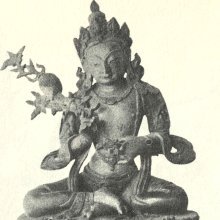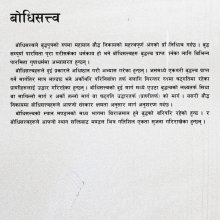Cita: 21 definitions
Introduction:
Cita means something in Hinduism, Sanskrit, Jainism, Prakrit, Buddhism, Pali, Marathi, Hindi, biology, Tamil. If you want to know the exact meaning, history, etymology or English translation of this term then check out the descriptions on this page. Add your comment or reference to a book if you want to contribute to this summary article.
Alternative spellings of this word include Chita.
Images (photo gallery)
In Hinduism
Purana and Itihasa (epic history)
Source: archive.org: Shiva Purana - English TranslationCitā (चिता) refers to the “funeral pyre”, according to the Śivapurāṇa 2.3.27 (“Description of the fraudulent words of the Brahmacārin”).—Accordingly, as Śiva (in guise of a Brahmacārin) said to Pārvatī: “[...] Sandal paste is applied on your body, while the ashes of the funeral pyre [i.e., citā-bhasma] on that of Śiva. Where your silken garment and where the elephant-hide of Śiva. Where the divine ornaments and where the serpents of Śiva? Where the deities that move about and where Śiva, fond of goblins and their oblations? Where the pleasing sound of his tabor? Where His peculiar drum called Damaru? Where the set of fine drums and the inauspicious sound of his horn? [...]”.

The Purana (पुराण, purāṇas) refers to Sanskrit literature preserving ancient India’s vast cultural history, including historical legends, religious ceremonies, various arts and sciences. The eighteen mahapuranas total over 400,000 shlokas (metrical couplets) and date to at least several centuries BCE.
Ayurveda (science of life)
Nighantu (Synonyms and Characteristics of Drugs and technical terms)
Source: WorldCat: Rāj nighaṇṭuCītā in the Hindi, or Citā in the Begali language refers to Citraka, also identified with (1) [white variety] Plumbago zeylanica Linn.; (2) [red variety] Plumbago rosea Linn. syn. or Plumbago indica Linn., both from the Plumbaginaceae or “leadwort” family of flowering plants, according to verse 6.43-45 of the 13th-century Raj Nighantu or Rājanighaṇṭu. Other than the words Cītā or Citā, there are more synonyms identified for this plant among which twenty are in Sanskrit.

Āyurveda (आयुर्वेद, ayurveda) is a branch of Indian science dealing with medicine, herbalism, taxology, anatomy, surgery, alchemy and related topics. Traditional practice of Āyurveda in ancient India dates back to at least the first millenium BC. Literature is commonly written in Sanskrit using various poetic metres.
In Jainism
General definition (in Jainism)
Source: The University of Sydney: A study of the Twelve ReflectionsCitā (चिता) refers to the “funeral pyre”, according to the 11th century Jñānārṇava, a treatise on Jain Yoga in roughly 2200 Sanskrit verses composed by Śubhacandra.—Accordingly, “Here [in this world], for that same man for whom the splendour of a royal inauguration is seen near daybreak, also on that day the smoke from [his] funeral pyre (citā-dhūma) is seen”.

Jainism is an Indian religion of Dharma whose doctrine revolves around harmlessness (ahimsa) towards every living being. The two major branches (Digambara and Svetambara) of Jainism stimulate self-control (or, shramana, ‘self-reliance’) and spiritual development through a path of peace for the soul to progess to the ultimate goal.
Biology (plants and animals)
Source: Google Books: CRC World Dictionary (Regional names)1) Cita in India is the name of a plant defined with Annona squamosa in various botanical sources. This page contains potential references in Ayurveda, modern medicine, and other folk traditions or local practices It has the synonym Guanabanus squamosus M. Gómez (among others).
2) Cita is also identified with Plumbago zeylanica It has the synonym Plumbago rosea L. (etc.).
Example references for further research on medicinal uses or toxicity (see latin names for full list):
· Field Museum of Natural History, Botanical Series (1938)
· Histoire des plantes de la Guiane Françoise (1775)
· Journal of Ethnobiology and Ethnomedicine. (2006)
· Taxon (1979)
· Species Plantarum (1753)
· Journal of Ethnopharmacology (2007)
If you are looking for specific details regarding Cita, for example side effects, diet and recipes, chemical composition, health benefits, extract dosage, pregnancy safety, have a look at these references.

This sections includes definitions from the five kingdoms of living things: Animals, Plants, Fungi, Protists and Monera. It will include both the official binomial nomenclature (scientific names usually in Latin) as well as regional spellings and variants.
Languages of India and abroad
Pali-English dictionary
Source: BuddhaSasana: Concise Pali-English Dictionarycita : (pp. of cināti) heaped; lined or faced with.
Source: Sutta: The Pali Text Society's Pali-English DictionaryCita, (pp. of cināti) heaped; lined or faced with (cp. citaka2) pokkharaṇiyo iṭṭhakāhi citā D.II, 178, cp. Vin.II, 123.

Pali is the language of the Tipiṭaka, which is the sacred canon of Theravāda Buddhism and contains much of the Buddha’s speech. Closeley related to Sanskrit, both languages are used interchangeably between religions.
Marathi-English dictionary
Source: DDSA: The Molesworth Marathi and English Dictionaryciṭa (चिट).—ad Silently, still. v rāha, kara. Ex. mī ita- kēṃ bōlalōṃ parantu tō ciṭa kēlā nāhīṃ.
--- OR ---
citā (चिता).—f (S) A funeral pile, a pyre. Pr. citē- pēkṣāṃ cintā kaṭhīṇa Anxiety is worse than death. According to the Shlok citā cintā samājēyā bindu mātrēṇa cādhikā || citā dahati nirjīvaṃ cintā dahati jīvinaṃ ||.
--- OR ---
citā (चिता).—f citēvān See cittā & cittēvān.
--- OR ---
cīṭa (चीट).—n (Properly chīṭa) Chintz.
--- OR ---
cīta (चीत).—a In wrestling. Backed, floored, thrown. 2 fig. Prostrated, ruined, marred: also lost in trade--money. 3 In play with cowries. Thrown on its back--a cowrie, pysa &c. Opp. to paṭa. 4 Scrawled or scribbled. cīta karaṇēṃ To kill outright.
Source: DDSA: The Aryabhusan school dictionary, Marathi-Englishciṭa (चिट).—ad Silently, still.
--- OR ---
citā (चिता).—f A funeral pile, a pyre.
--- OR ---
cīṭa (चीट).—n Chintz.
--- OR ---
cīta (चीत).—a Thrown, backed; prostrated. Scrawled. cīta karaṇēṃ Kill outright.
Marathi is an Indo-European language having over 70 million native speakers people in (predominantly) Maharashtra India. Marathi, like many other Indo-Aryan languages, evolved from early forms of Prakrit, which itself is a subset of Sanskrit, one of the most ancient languages of the world.
Sanskrit dictionary
Source: DDSA: The practical Sanskrit-English dictionaryCita (चित).—p. p. [ci-kta]
1) Collected, piled up, heaped, gathered.
2) Hoarded, accumulated; चितचैत्यो महातेजाः (citacaityo mahātejāḥ) Mahābhārata (Bombay) 3.126.38.
3) Got, acquired.
4) Covered with, full of; कृमिकुलचितम् (kṛmikulacitam) Bhartṛhari 2.9.
5) Set or inlaid with.
-tam A building.
--- OR ---
Citā (चिता).—
1) A funeral pile, pyre; कुरु संप्रति तावदाशु मे प्रणिपाताञ्जलियाचितश्चिताम् (kuru saṃprati tāvadāśu me praṇipātāñjaliyācitaścitām) Kumārasambhava 4.35; चिताधिरोहणम् (citādhirohaṇam) R.8.57; चिताभस्मन् (citābhasman) Kumārasambhava 5.69.
2) A heap, assemblage, multitude
Source: Cologne Digital Sanskrit Dictionaries: Edgerton Buddhist Hybrid Sanskrit DictionaryCita (चित).—(orig. ppp. of Sanskrit ci-), orig. piled up, heaped up; so, thick, dense (of hair), stout, large (of fingers), full, stout (of the space between the shoulders), in cpds. (1) cita-keśa, having thick, dense hair, one of the anuvyañ- jana of the Buddha: Mahāvyutpatti 343 = Tibetan stug pa, dense, thick; Mahāvastu ii.44.10, so read with one ms., the other vivitra° (Senart em. citra°); instead Dharmasaṃgraha 84 has citra-keśa, which I believe is certainly a corruption; lacking in the Lalitavistara list; (2) citāṅguli, with stout, large fingers, another anuvyañjana: Mahāvyutpatti 274 (here Tibetan rgyas = large); con- firmed by Pali according to Burnouf, Lotus, 585; this time the corruption citrā° (above) is more widespread, being printed in Mahāvastu ii.43.9 (only one ms., lacuna in the other); Dharmasaṃgraha 84 (but one ms. ciṃtā°); and Lalitavistara 106.12—13 (Lefm. anu- pūrvacitrāṅguliś ca, combining this with anupūrvāṅguli; most mss. have the reverse order, as does Tibetan, which also renders by rgyas pa = large, proving that it had citā° [Page229-b+ 71] and not citrā°); (3) citāntarāṃsa (or °śa) (= Pali citan- taraṃsa, e.g. Dīghanikāya (Pali) ii.18.10; commentary ii.449.6 antaraṃsaṃ vuccati dvinnaṃ koṭṭhāsānaṃ antaraṃ; taṃ citaṃ pari- puṇṇaṃ assā ti), with full, well filled-in, space between the shoulders, one of the 32 lakṣaṇa: Mahāvyutpatti 251, Tibetan thal goṅ rgyas pa = large shoulders; so also Tibetan on Lalitavistara 105.18; all lists of the lakṣaṇa (q.v.) intend the same form, only varying between °āṃsa and °āṃśa. In Gaṇḍavyūha 69.26 read citta with 2d ed. for cita; see s.v. avabhā. See also next.
Source: Cologne Digital Sanskrit Dictionaries: Shabda-Sagara Sanskrit-English DictionaryCita (चित).—mfn.
(-taḥ-tā-taṃ) 1. Covered, veiled, concealed. 2. Collected, accumulated. 3. Piled, heaped. f.
(-tā) 1. A funeral pile. 2. A heap, an assemblage. E. ci to collect, &c. affix karmaṇi kta; also citi and citī
Source: Cologne Digital Sanskrit Dictionaries: Benfey Sanskrit-English DictionaryCitā (चिता).—i. e. cita, ptcple. of the pf. pass. of 1. ci, f. A funeral pilc, [Rājataraṅgiṇī] 5, 226.
Source: Cologne Digital Sanskrit Dictionaries: Cappeller Sanskrit-English DictionaryCita (चित).—[adjective] covered, strewn with ([instrumental] or —°); [feminine] ā layer, pile of wood, [especially] funeral pile; [neuter] building.
Source: Cologne Digital Sanskrit Dictionaries: Monier-Williams Sanskrit-English Dictionary1) Cita (चित):—[from ci] a mfn. piled up, heaped, [Ṛg-veda i, 112, 17; 158, 4; Atharva-veda] etc.
2) [v.s. ...] placed in a line, [Ṛg-veda vii, 18, 10]
3) [v.s. ...] collected, gained, [Muṇḍaka-upaniṣad]
4) [v.s. ...] forming a mass (hair), [Buddhist literature; cf. Lexicographers, esp. such as amarasiṃha, halāyudha, hemacandra, etc.]
5) [v.s. ...] covered, inlaid, set with, [Mahābhārata; Rāmāyaṇa] etc.
6) [v.s. ...] n. ‘a building’ See pakveṣṭaka-
7) Citā (चिता):—[from cita > ci] a f. a layer, pile of wood, funeral pile, [Lāṭyāyana viii; Mahābhārata] etc.
8) [v.s. ...] a heap, multitude, [cf. Lexicographers, esp. such as amarasiṃha, halāyudha, hemacandra, etc.]
9) [from ci] b f. of ta.
10) Cita (चित):—b 1. citi See √1. ci.
Source: Cologne Digital Sanskrit Dictionaries: Yates Sanskrit-English DictionaryCita (चित):—[(taḥ-tā-taṃ) a.] Covered, collected. f. (tā) A funeral pile; a heap.
Source: DDSA: Paia-sadda-mahannavo; a comprehensive Prakrit Hindi dictionary (S)Cita (चित) in the Sanskrit language is related to the Prakrit words: Cia, Ciṇia, Ciyakā, Ciyagā, Cīa.
[Sanskrit to German]
Sanskrit, also spelled संस्कृतम् (saṃskṛtam), is an ancient language of India commonly seen as the grandmother of the Indo-European language family (even English!). Closely allied with Prakrit and Pali, Sanskrit is more exhaustive in both grammar and terms and has the most extensive collection of literature in the world, greatly surpassing its sister-languages Greek and Latin.
Hindi dictionary
Source: DDSA: A practical Hindi-English dictionary1) Ciṭa (चिट) [Also spelled chit]:—(nf) a chit.
2) Cita (चित) [Also spelled chit]:—(a) supine; (lying) flat on the back; (nm) mind, heart; head (of a coin); ~[cora] alluring, appealing (person); he who steals away one’s heart; —[karanā] to throw flat on the back; to overpower, to vanquish; —[kara denā] to bowl over, to overpower, to vanquish; —[paṭa karanā] to decide this way or that (by throw of a coin); — [bhī merī paṭa bhī merī] ([aṃṭā mere bāpa kā]) heads I win, tails you lose; —[honā] to be overpowered, to be vanquished; to fall on the back.
3) Citā (चिता) [Also spelled chita]:—(nf) funeral pyre; —[para caḍhanā] to immolate oneself.
4) Cītā (चीता) [Also spelled chita]:—(nm) a leopard; panther; (a) liked, longed for (as [manacītā]).
...
Kannada-English dictionary
Source: Alar: Kannada-English corpusCiṭa (ಚಿಟ):—[noun] '[used in dupl. as ಚಿಟಚಿಟ [citacita]] the sharp, repeated sound (as of blasting mustard seeds being fried).'
--- OR ---
Ciṭa (ಚಿಟ):—[adjective] of limited size; of comparatively restricted dimensions; not big; little; small.
--- OR ---
Ciṭa (ಚಿಟ):—
1) [noun] any bird of very small size.
2) [noun] a small pawn used in the game of dice.
3) [noun] a dice small size.
4) [noun] a small piece, fragment of a whole.
--- OR ---
Cita (ಚಿತ):—
1) [adjective] laid in pile; heaped up; accumulated (at a place).
2) [adjective] covered; filled; full.
Kannada is a Dravidian language (as opposed to the Indo-European language family) mainly spoken in the southwestern region of India.
Tamil dictionary
Source: DDSA: University of Madras: Tamil LexiconCītā (சீதா) noun < Sītā. See சீதை. சீதா பவளக் கொடியன்னவட் டேடி [sithai. sitha pavalag kodiyannavad dedi] (கம்பராமாயணம் உருக்கா. [kambaramayanam urukka.] 85).
Tamil is an ancient language of India from the Dravidian family spoken by roughly 250 million people mainly in southern India and Sri Lanka.
See also (Relevant definitions)
Starts with (+198): Ci-talaicattanar, Cita-kantuvatam, Cita-mekarokam, Cita-pittacuvaram, Cita-vatakatuppu, Citabarisu, Citabhasma, Citabhumi, Citacaityacihna, Citacamiyam, Citacaram, Citaci, Citacikannicceti, Citacintu, Citacintukkilanku, Citacita, Citacudaka, Citacuracam, Citacuram, Citada.
Ends with (+378): Abhinishcita, Abhiracita, Abhirucita, Abhishecita, Abhisucita, Abhivancita, Abhiyacita, Abhyacita, Abhyarccita, Abhyarcita, Abhyuccita, Abhyucita, Accita, Acita, Adhikodrecita, Adhimuccita, Adhisucita, Adhvarocita, Agrasucita, Agurucarcita.
Full-text (+1706): Cit, Cia, Bala, Citagni, Kusumacita, Manakcit, Cidatman, Citacudaka, Cetas, Cea, Atibala, Shyenacit, Sitha, Citranguli, Odana, Citpravritti, Nikcitam, Cicchakti, Tapashcitamayana, Paricita.
Relevant text
Search found 169 books and stories containing Cita, Chitha, Cit, Ciṭ, Ciṭa, Citā, Cīṭa, Cīta, Cītā, Seethaa, Sida, Sidha, Sitha; (plurals include: Citas, Chithas, Cits, Ciṭs, Ciṭas, Citās, Cīṭas, Cītas, Cītās, Seethaas, Sidas, Sidhas, Sithas). You can also click to the full overview containing English textual excerpts. Below are direct links for the most relevant articles:
Rig Veda (translation and commentary) (by H. H. Wilson)
Abhidhamma in Daily Life (by Ashin Janakabhivamsa) (by Ashin Janakabhivamsa)
Part 2 - How The World Came To An End < [Chapter 11 - Planes Of Existence]
Garga Samhita (English) (by Danavir Goswami)
Verse 1.13.26 < [Chapter 13 - The Liberation of Pūtanā]
Verse 5.8.51 < [Chapter 8 - The Killing of Kaṃsa]
Verse 2.16.12 < [Chapter 16 - The Worship of Tulasī]
A History of Indian Philosophy Volume 1 (by Surendranath Dasgupta)
Part 16 - Vedānta Theory of Illusion < [Chapter X - The Śaṅkara School Of Vedānta]
Part 11 - Locus and Object of Ajñāna, Ahaṃkāra, and Antaḥkaraṇa < [Chapter X - The Śaṅkara School Of Vedānta]
Part 15 - Ātman, Jīva, Īśvara, Ekajīvavāda and Dṛṣṭisṛṣṭivāda < [Chapter X - The Śaṅkara School Of Vedānta]
Chaitanya Bhagavata (by Bhumipati Dāsa)
Verse 1.8.25 < [Chapter 8 - The Disappearance of Jagannātha Miśra]
Verse 2.6.29 < [Chapter 6 - The Lord’s Meeting with Advaita Ācārya]
Verse 2.8.70 < [Chapter 8 - The Manifestation of Opulences]
The Devi Bhagavata Purana (by Swami Vijñanananda)
Related products
(+21 more products available)








